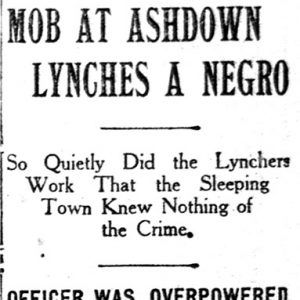calsfoundation@cals.org
Doc McClain (Lynching of)
Doc McClain (whose name is sometimes rendered Dock McLain or McLane) was lynched in Ashdown (Little River County) on May 13, 1910, for allegedly stabbing wealthy young farmer Ernest Hale.
According to the 1900 census, farmer Doc McClain (whose age was not given) was living in a rented home in Franklin (Little River County) with his wife Mary (aged thirty) and their two children, Lizzie (seven) and Ezekil (three). They had been married for ten years. Neither Doc nor Mary could read or write.
According to numerous accounts, Doc McClain stabbed Ernest Hale in a store sometime in April 1910. Hale survived the attack and was hospitalized. At the time, it was feared that he would die. Local citizens threatened to lynch McClain, so he was removed to jail in Texas. On the night of May 13, deputies James Wheeler and Clyde Head were bringing McClain back to Ashdown for a preliminary hearing. Word of their actions leaked out, and area citizens quietly formed a mob. As the deputies approached the jail, one went ahead to notify the jailer. Several masked men overpowered the remaining deputy, Deputy Head, who was injured in an attempt to protect McClain. The remainder of the mob took possession of McClain and hanged him on a tree near the jail. According to the Arkansas Gazette, “After the lynching, the mob quietly dispersed.”
According to the Gazette’s account, it was commonly believed by this time that Ernest Hale would recover from his wounds. In an interesting twist to the story, a few days prior to the lynching, Hale’s brother, Archie, killed an African-American man who allegedly had pulled a knife on him during an altercation.
Mary McClain remained in Little River County after her husband’s murder. At the time of the 1910 census, she was living with her four children and her father-in-law, Henry McClain. Mary and the older children could all read and write and, along with Henry, were engaged in farming. According to noted legal scholar Anita Hill, whose grandparents lived in southwestern Arkansas, Mary McClain remained in Little River County, where she continued to work in the fields until her death in 1925. Ernest Hale recovered from his injuries and became extremely prosperous, accumulating thousands of acres of land.
For additional information:
Hill, Anita. Reimagining Equality: Stories of Gender, Race, and Finding Home. Boston: Beacon Press, 2011.
“Mob at Ashdown Lynches a Negro.” Arkansas Gazette, May 15, 1910, p. 1.
Nancy Snell Griffith
Clinton, South Carolina








Comments
No comments on this entry yet.